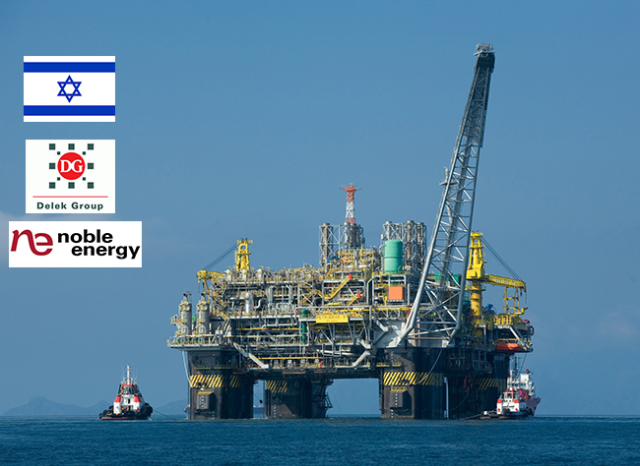Israeli Populist Protest Against Offshore Gas Development Deal Misguided
Last week, Israeli PM Netanyahu effectively declared offshore gas deal with Delek Partners and US Noble Energy, Inc. a national security issue. This was the conclusion reached after discussions with the development partners and economic analysis of other major gas developments resulting in a proposed framework to replace a series of bust deals with the Israel Antitrust Authority. He and his Energy Minister Yuval Steinitz may have a daunting task ahead next week contending with coalition partner, Economics Minister Aryeh Deri of Shas and Populist/Green opponents of the new deal. They support the position of the outgoing General Director of the Israel Antitrust Authority, Dr. David Gilo who resigned on May 26th objecting to the new deal saying he would not leave until August 2015. We have written about the offshore gas developments in several New English Review (NER) articles andIconoclast posts. See: “Could Israel Lose the Energy Prize in the Eastern Mediterranean” NER (Jan. 2015). We specifically pointed out the radical populist actions by Dr. David Gilo, who didn’t appear to have the requisite understanding of energy market dynamics, let alone geo-political realities, or the risk capital requirements to develop and distribute gas.
Last December Gilo reneged on a March 2014 comprise deal with the Delek-Noble development partners instead accusing them of being a duopoly operating in restraint of trade. Instead he sent the development partners a consent decree forcing sale of interests in the offshore gas deals for which they provided the risk capital to bring to develop them. Thus began the unraveling of a potentially important development of significant natural gas reservoirs in Israel’s offshore Exclusive Economic Zone in the Eastern Mediterranean Levant Basin. Delek and Houston based Noble Energy had spent over $6 billion before bringing in the 9 trillion cubic feet tcf Tamir field in 2009 and the 21 tcf Leviathan field in 2011. Delivery of gas from the Tamar field began in 2013, while the significant larger Leviathan field might be brought on stream in 2018. When the Knesset adopted revised royalty and tax scheme proposed by the Sheshinski Committee in 2013, Israel looked like it might be on the path to a bright economic future. That included the possibility of earning upwards of $70 billion in future revenues funding an authorized Sovereign Wealth Fund. The tax revenues from the gas sold for domestic use and export would substantively alleviate social program and national security budgetary burdens. That was also evident to former Reagan National Security aide, Prof. Norman Bailey of Haifa U and, Caroline Glick, deputy managing editor of the Jerusalem Post in an op-ed published on Thursday, July 2, 2015, Israel’s Populist Energy Crisis.
Saturday night, July Fourth, the Jerusalem Post reported, thousands from the student Green Course movement protesting the new gas deal from Netanyahu in Tel Aviv’s Rabin Square, Jerusalem, Beersheba and at the PM’s home in Caesarea. According to the Post, “The activists demanded lower gas prices and increased use of gas in domestic factories, accusing the government of bending to foreign interests.”
The new proposal that Netanyahu is poised to secure cabinet approval on Monday, July 6th had the following terms according to the Post:
Under the government’s gas outline, Delek subsidiaries Delek Drilling and Avner Oil Exploration would have to exit the 282-b.cu.m, Tamar reservoir, whose gas began flowing to Israel in March 2013, selling their assets there within six years.
Houston-based Noble Energy could remain the basin’s operator, needing to dilute its ownership from the current 36 percent share to 25 percent within the same time frame.
The Delek subsidiaries and Noble Energy would be required to sell their holdings in two much smaller offshore reservoirs, Karish and Tanin, within 14 months. Because the buyer would be required to sell gas only to Israel, export allocations intended for these reservoirs would be transferred to Leviathan, according to the outline.
In 2013, the cabinet decided to cap exports at 40% of production, and pipelines designated for export will not be entitled to tax benefits guaranteed to local pipelines, as mandated by the Sheshinski Committee, whose recommendations on hydrocarbon taxation became law in 2013.
Glick in her Post op Ed suggested that the hit that Israel had taken in foreign direct investment had a lot to do with misguided populist economic doctrine that pervades the Zionist Union, Yesh Atid, some coalition partners and Knesset opposition. From my own investment banking exposure in Israel these populist economic views are a reflection of the founding Labor Socialist parties and the Histadrut. The latter owns enterprises that have never been effectively privatized. It is also a poor reflection on a country that prides itself on the law, that doesn’t extend to honoring contractual obligations. She argues that is reflected in downward trends in Foreign Direct Investment cited in the most recent UN Council on Trade and Development report:
In 2014 Foreign Direct Investment in Israel was 46 percent below levels in 2013, dropping from $11.8 billion to $6.4bn. During the same period worldwide direct foreign investment dropped a mere 16%, meaning the drop in investment in Israel was nearly three times the global average.
Israel also had demonstrated that it was okay for foreign partners like Noble Energy to invest billions in offshore energy development, just as long if it came through, that the terms could change denying appropriate returns to risk investors. Moreover, the hue and cry in Israel that the duopoly of the Delek –Noble gas partnership could result in price gouging was false. When in fact since the Tamir field came on stream average gas prices dropped in Israel resulting in both lower energy and manufacturing costs.
The Israel Noble Energy manager Binyamin Zomer reinforced Glick’s observations with these comments cited in Globes Israel Business:
Let’s make it clear. We didn’t break the law, and we didn’t prevent competition. What we did do was to succeed beyond the expectations of the government that invited us to invest in Israel. Israel was happy, it seems, for Noble Energy to risk its money in Israel, as long as it was unsuccessful. There is a monopoly – that’s not a crime. Let’s understand why this happened. The company agreed to invest its money where other companies refused (and we won’t apologize for that); the supply of gas from Egypt ended in 2011 (and that was not our fault); other companies with no experience found no gas (again, not our fault); and the incessant interference by regulators with no background in oil and gas drove every gas company away, except for Noble Energy.
Glick offered the following proposals to rectify the impasse:
If we are to correct the damage – to our energy market specifically and to the Israeli economy overall – there is only one path to take. The Knesset must abrogate the 2011 windfall profits law and end all attempts to define the Delek-Noble partnership as a monopoly while seeking new, creative ways to seize their profits.
Then, the Knesset must pass a law that will protect investors from attempts to retroactively change the terms of operating licenses they receive from the State of Israel.
Israel has enough problems with the anti-Semitic boycott movement that is growing by leaps and bounds. We need to curb our populist tendencies and stop making those who want to invest in Israel feel that they are fools to do so.
As the late Hollywood and radio personality of my youth Bill Bendix might opine, “this is a rotten development.” Israel’s obsessive democracy makes the country prone to divisive squabbles and in this case possibly resulting in losing a glittering economic future. This latest Knesset speed bump doesn’t bode well for Israel achieving first world economic preeminence. As we have written innumerable times these Israeli populists are economically uniformed genetic socialists who have no understanding of both geo-political resource realities and commodity market dynamics or the risk reward relationships undergirding energy development. We blame Dr. Gilo whose dictatorial arrogance reneging the original compromise deal with both Delek Group and Noble Energy was nothing but political grandstanding . He was awaiting the victory of Zionist Union and populist parties like Yesh Atid that didn’t occur on March 17, 2015. He should never have been permitted to remain as the radical leftist Antitrust Authority General Director until his departure in August after he rejected the Netanyahu government’s replacement deal on May 26th. No self respecting energy development group will invest a shekel in Israel’s energy resources because it is no better than a third world country that doesn’t honor agreements. Israel may have just screwed itself out of the future source of wealth that would alleviate social disparities and the budgetary burdens of national defense. Prime Minister Netanyahu is now caught in a nearly impossible task to push through this new agreement on July 6th given the makeup of his ruling coalition. The fictional book and film character Forest Gump has the last word on those populist protesters in Israel, “stupid is as stupid does”.
EDITORS NOTE: This column originally appeared in the New English Review. The featured image is of Tel Aviv offshore gas deal protesters, July 4, 2015. Source: Jerusalem Post.


